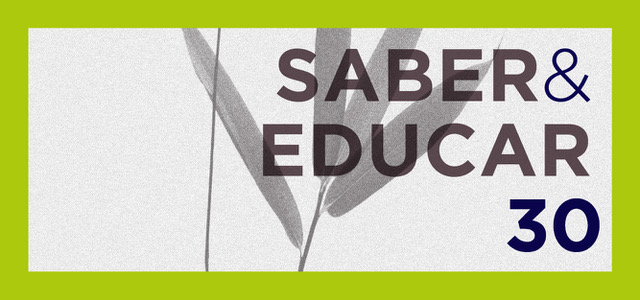Perspectives on intervention in periods of social recollect
DOI:
https://doi.org/10.25767/se.v30i1.29526Keywords:
Educação de infância, Pandemia, Necessidades Educativas EspecíficasAbstract
This research project focuses on the perspectives of Kindergarten Teachers on their intervention with children with educational needs during stay-at-home order. The methodology is based on a quantitative approach, having a questionnaire survey as a research tool. The results obtained highlight the need to understand the perspectives of kindergarten teachers on the intervention during the pandemic period. On the other hand, they highlight the importance of the role of the educator, as he/she must be willing to listen and observe children's behaviors to intervene in a positive way.
References
Alarcão, I. (1991). Construção do Conhecimento e Ludicidade. In A aprendizagem como aquisição e construção do conhecimento. Cadernos CÎDInE.
Almeida, M.S. (2007) A escola inclusiva do séc XXI: as crianças podem esperar tanto tempo?https://www.psicologia.pt/artigos/ver_opiniao.php?codigo=AOP0115
Associação de Profissionais de Educação de Infância (2020). Contributo para assegurar a qualidade pedagógica em educação pré-escolar (3-6 anos) em tempo de Covid-19. APEI. http://apei.pt/upload/ficheiros/var/COVID_final_final_redux.pdf
Cavaco, N. (2009). O Profissional e a Educação Especial - Uma abordagem sobre o autismo. Editorial Novembro.
Cosme, A. (1997). Autonomia para a escola democrática. https://repositorio-aberto.up.pt/bitstream/10216/21184/2/84390.pdf
Decreto-Lei n.º 54/2018, de 6 de julho. Educação Inclusiva. Diário da República, 1.ª série- nº 129, 2918 - 2928.
Fernandes, A. J. (1993). Métodos e Regras para Elaboração de Trabalhos Académicos e Científicos. Porto Editora.
Formosinho, J.O. (2011). O Espaço e o tempo na Pedagogia-em-Participação. Porto Editora.
Freitas. S. (2012). As Tic e os alunos com NEE: A perceção dos professores de Educação Especial de Viseu. Universidade Católica Portuguesa Centro Regional das Beiras, Viseu.
Gerhardt. T & Silveira. D. (2009) Métodos de Pesquisa. Universidade Federal do Rio Grande do Sul, Brasil. http://www.ufrgs.br/cursopgdr/downloadsSerie/derad005.pdf
Instituto Nacional de Estatística - INE (2021). https://www.ine.pt/xportal/xmainxpid=INE&xpgid=ine_indicadores&indOcorrCod=0008258&contexto=bd&selTab=tab2
Lakatos, E. & Marconi, M. (2002). Técnicas de Pesquisa. (5ª ed.). Editora Atlas.
Ministério da Educação (2001) Decreto-Lei n.º 241/2001, de 30 de Agosto. https://dge.mec.pt/sites/default/files/EInfancia/documentos/dl241_01.pdf?fbclid=IwAR3SPBq7ALMKJZvtVyBKulxV5gsmOLVN9ms3V-Mmg-tWGtYRL4X6sx2TWPw
Ministério da Educação. (2020). Orientações para a reabertura da educação pré-escolar. Ministério da Educação/Direção-Geral da Educação (DGE). Consultado em: 14/04/2021, disponível em: https://www.dge.mec.pt/sites/default/files/orientacoes_para_a_reabertura_da_educacao_pre-escolar.pdf
Nielsen. L. B. (1999). Necessidades Educativas Especiais na sala de aula. Um guia para professores. Porto Editora.
Pequito.P, Pinheiro, A., Silva, B. & Santos, A.I. (2020). I3 Intervenção, Interação e Infância. Escola Superior de Educação de Paula Frassinetti uma iniciativa do OFEI. https://ofei.esepf.pt/?page_id=406
Pires. M. C. (2007). Educador de infância e práticas. Profedições.
Seabra. M (2011) Ser Educadora: um percurso de aprendizagem. http://repositorio.esepf.pt/bitstream/20.500.11796/1147/4/TM-ESEPF-PE-2011_RELAT_RIO.pdf
Silva, L.I., Marques; L., Mata, L.; Rosa, I. (2016) Orientações Curriculares para a Educação Pré-escolar, Ministério da Educação: Portugal. https://www.dge.mec.pt/orientacoes-curriculares-para-educacao-pre-escolar
Downloads
Additional Files
Published
How to Cite
Issue
Section
License

This work is licensed under a Creative Commons Attribution-NonCommercial-NoDerivatives 4.0 International License.
- The opinions expressed by the authors are their exclusive responsibility.
- The journal reserves the right to make the original, normative changes, spelling and grammar, in order to maintain the standard language of worship, while respecting the style of the authors.
- Authors retain copyright and grant the journal right of first publication with the work simultaneously licensed under a Creative Commons Attribution License (BY-NC-SA 4.0) that allows others to share the work with an acknowledgement of the work's authorship and initial publication in this journal.
- Authors are able to enter into separate, additional contractual arrangements for the non-exclusive distribution of the journal's published version of the work (e.g., post it to an institutional repository or publish it in a book), with an acknowledgement of its initial publication in this journal.
- Authors are permitted and encouraged to post their work online (e.g., in institutional repositories or on their website) prior to and during the submission process, as it can lead to productive exchanges, as well as earlier and greater citation of published work (See The Effect of Open Access).
PRIVACY STATEMENT
The names and email addresses entered in this journal site will be used exclusively for the stated purposes of this journal and will not be made available for any other purpose or to any other party.






